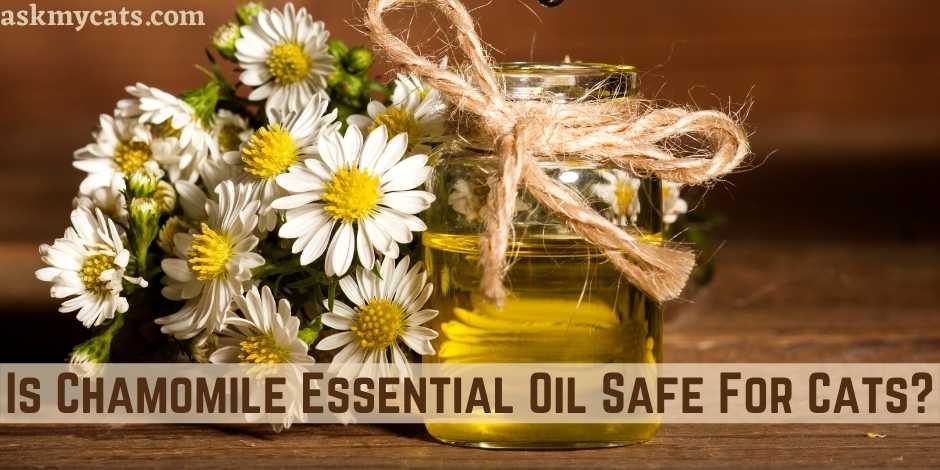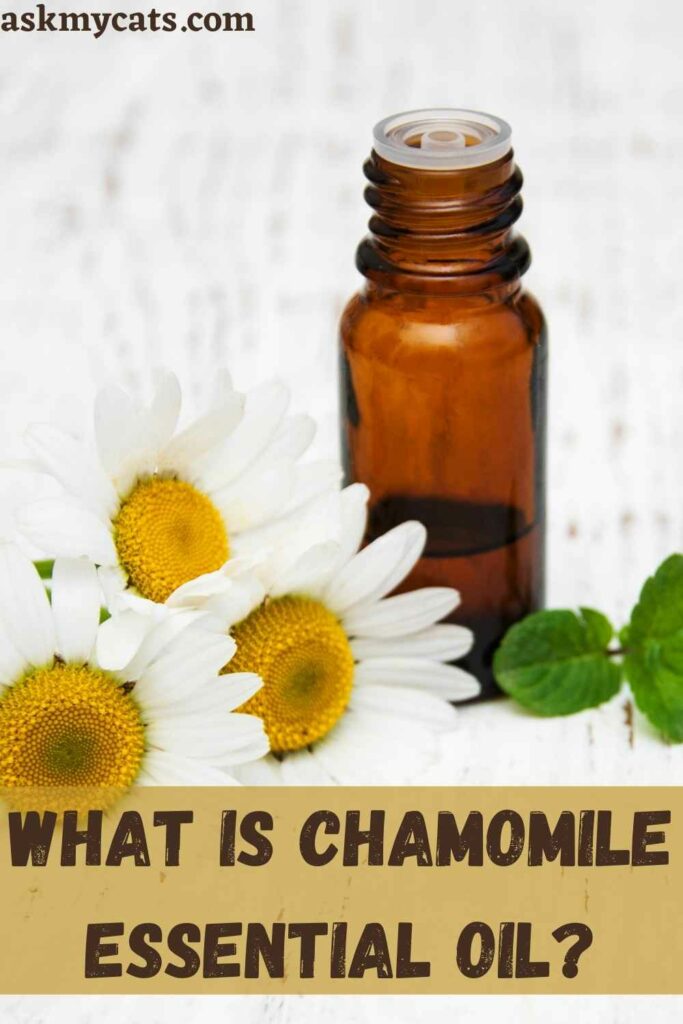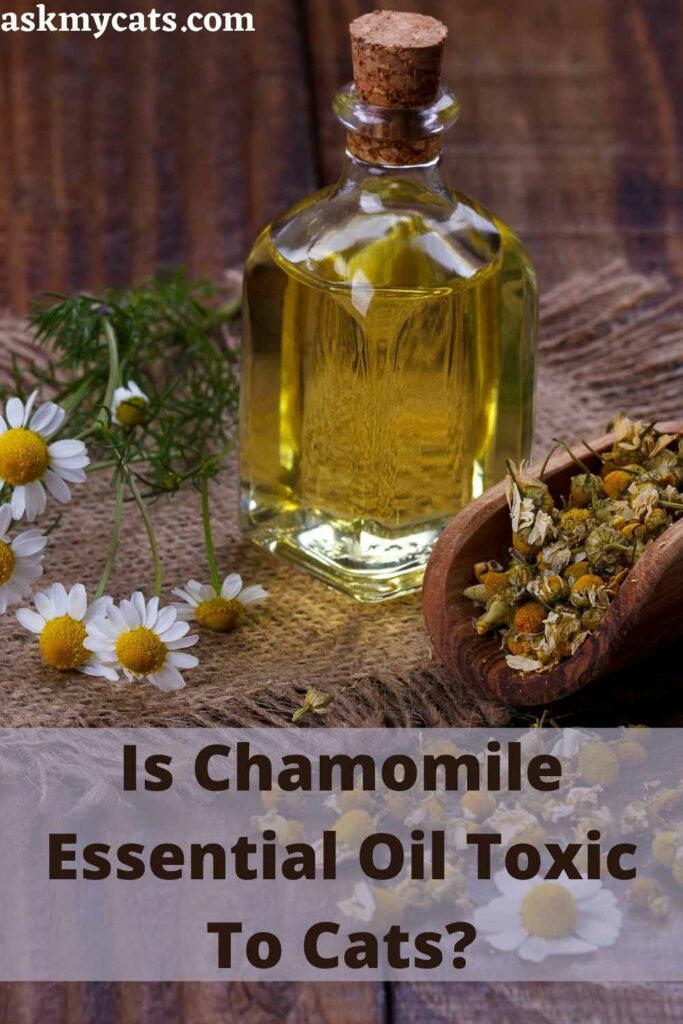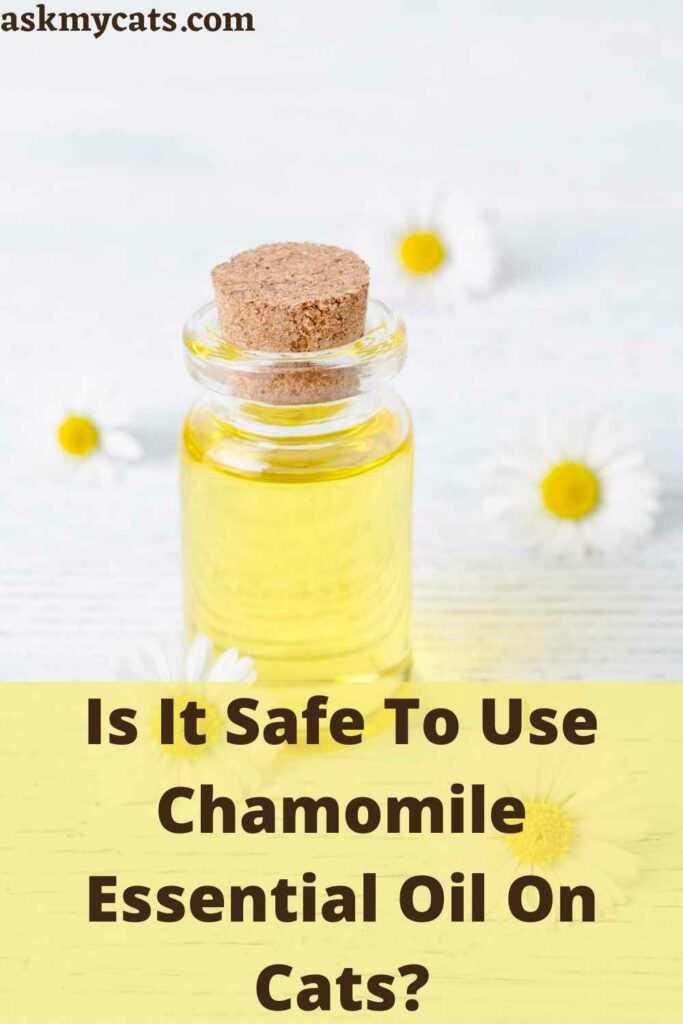Your cat has an exceptional sense of smell. Cats have far more sensitive senses than humans, and their noses are far more sensitive than ours, so scents that you find calming and wonderful could be extremely strong and overwhelming for your cat.
If you have a domestic pet cat and want to use essential oils, then this might cause some health concerns for your cat is not used correctly.
So, is chamomile essential oil safe for cats?
No, chamomile oil is not safe for cats because the essential oil is far too potent in its concentrated form to be used around cats. It could be fatal if they ingest the oil, and diffusing or using it in any other way around them could also make them sick.
This article will discuss whether or not it is safe to use chamomile oil around cats.


Give Your Cat the Perfect Day
Get the Free Ebook!
What Is Chamomile Essential Oil?
Chamomile oil is an essential oil that’s been used for a variety of conditions, from digestive issues to wound healing, for many years.

Chamomile is the common name for several daisy-like plants in the Asteraceae family.
Matricaria recutita and Anthemis nobilis are two of the species that are commonly used to make herbal infusions for traditional medicine.
Despite the lack of scientific evidence that consuming chamomile in foods or beverages has any health benefits, chamomile is well-known for its traditional use in a variety of applications.
Because of its anti-inflammatory, antioxidant, and mild astringent properties, many people recommend and use chamomile flower dry powder for a variety of traditional health problems.
Emerging research has begun to shed light on other potential benefits, such as its ability to aid in the treatment of depression, anxiety, and sleep disorders.
You can use a diffuser to inhale the oil, apply it to your skin with a carrier oil, or add a few drops to your bath. As with any essential oil, take all necessary precautions.
Before using essential oils to treat a medical condition, always consult with your doctor.
Is Chamomile Essential Oil Toxic To Cats?
Yes, chamomile essential oil is toxic to cats as cats lack the enzyme needed to break down the essential oil which can lead to liver disease.

Essential oils are organic plant constituents that contribute to fragrance and flavor.
They are volatile and organic. To extract plants, they are distilled or cold-pressed.
Insecticides, aromatherapy, personal care products (such as antibacterials), flavorings, herbal remedies, and liquid potpourri are just a few of the uses for essential oils.
Chamomile essential oils are toxic to cats. They are quickly absorbed through the skin and orally before being metabolized in the liver.
Because cats lack an essential enzyme in their liver, they have a hard time metabolizing and eliminating toxins like essential oils.
Essential oils contain phenols and phenolic compounds, which are toxic to cats.
The greater the risk to the cat, the higher the concentration of essential oil.
Depending on the amount of exposure, symptoms may include drooling, vomiting, tremors, ataxia (wobbliness), respiratory distress, low heart rate, low body temperature, and liver failure.
If you notice any of these symptoms, take your cat outside immediately and to a veterinary emergency center if the symptoms do not improve quickly. A low heart rate, low blood pressure, and signs of liver failure may be noted by the veterinarian.
The higher the concentration of essential oils, the greater the risk to your cat. If your cat inadvertently consumes oils, take him or her to the veterinarian as soon as possible.
Cats absorb essential oils that come into direct contact with their skin, such as chamomile. Inhaling diffused oils in the air can cause respiratory problems.
They can also build upon the fur, causing your cat to ingest them while licking and cleaning. Toxicity can develop suddenly or gradually over time.
Is It Safe To Use Chamomile Essential Oil On Cats?
No, it is not safe to use chamomile essential oil on cats.

Cats should not be applied or fed essential oils and oils should not be left in areas where they may come into contact with them.
While some oils are insect repellent and smell wonderful, there is a high risk of serious or fatal reactions in your cat.
Your curious cat will appreciate it. If your cat has asthma, allergies, or other respiratory conditions, avoid using essential oils at all.
Cats should be kept out of rooms with high essential oil concentrations.
Kittens, elderly cats, and cats suffering from liver or respiratory problems should avoid rooms with essential oil diffusers.
Many essential oils, including chamomile oil, have the potential to be toxic to cats. When licked up after a spill, it is toxic.
Diffusers that emit a pleasant, nose-pleasing aroma may appear to be harmless, but they are dangerous because they use water vapor to disperse tiny oil droplets into the air.
Inhaling diffused oils is known to cause negative respiratory effects in humans and cats when used in a small space and/or for an extended period of time.
It’s worth noting that cats and dogs are far more sensitive to scents than humans. What you might consider a minor, fragrant scent to be can be overwhelming and harmful to an animal.
Do Cats Like The Smell Of Chamomile Essential Oil?
Whether a cat will like the smell of chamomile essential oil or not is completely dependent upon each individual cat and its personality.
The aroma of chamomile oil is neither among the popular scents that cats dislike nor among the scents that cats prefer.
Using chamomile oil in your home or near your cat will bring this to light. Check to see if your cat is purring and moving around near the diffuser. If so, your cat enjoys the scent of chamomile oil.
Is Chamomile Essential Oil Safe To Diffuse Around Cats?
No, chamomile essential oil is not safe to diffuse around cats.
Cats are toxic to many essential oils, including chamomile oil. Whether applied to the skin or used in diffusers, these are toxic.
Diffuser oil can still be harmful because it uses water vapor to diffuse tiny oil droplets into the air. Inhaling diffused chamomile oil can cause aspiration pneumonia and other toxic effects if the diffuser is used in a small space or for a long time.
If you’re going to use a diffuser in your house, make sure it’s out of reach of your cat, and talk to your vet about which oils are safe to use. If your cat has breathing problems, however, using a diffuser anywhere in the house is not a good idea.
You might want to think twice about using an oil diffuser if you have kittens or curious cats. Because cats have such a sensitive respiratory system, inhaled toxins have a negative impact on them.
Kittens and curious cats are known to knock over diffusers, spilling the oil. Toxic effects can occur if the oil gets on the cat’s fur (which it could ingest later while grooming) or if the cat licks the spill.
How To Dilute Chamomile Oil?
Chamomile oil for cats should be diluted with 9 parts carrier oil and 1 part chamomile oil.
Always consult your veterinarian before using chamomile essential oil topically on your cat. This will prevent you from accidentally using a product that could harm your four-legged companion.
Also, because chamomile oil is toxic to cats, it should never be given to them. This means you shouldn’t put it on your cat’s legs or paws, where it could be licked.
It’s also worth noting that these oils must first be diluted. Use a carrier oil that you know is safe for cats, and seek professional advice if you have any questions.
For proper dilution, most pet-friendly oils require at least 1 drop of pure chamomile essential oil to 50 drops of pure carrier oil. Even the most gentle essential oils can irritate the airways when inhaled.
Frequently Asked Questions
What are the things to keep in mind while using chamomile essential oil around cats?
Essential oils of chamomile should not be applied to any part of a cat’s body undiluted. Cats have a habit of grooming themselves by licking themselves. The cat will lick the oil off its fur even if you apply chamomile essential oil to its tail. Chamomile essential oil is far more effective when applied directly to the skin (yours or that of your cat). Diffusing chamomile essential oil in a room is far safer for your cat than applying oils directly to his or her skin. Touch your eyes, nose, mouth, and paws as little as possible. Avoid those sensitive areas on your domestic cat, even if you have diluted chamomile essential oil. Do not pet your cat after using essential oils on yourself. When applying essential oils to your skin through body care products, lotions, or creams, use caution. Because it’s possible that your cat will come into physical contact with you and lick the oil on your skin. You must wash your hands before petting her.
How to safely use essential oils?
Any essential oil, especially if used incorrectly or in excess, can be harmful to cats’ health. Dilution or diffusion of essential oils is still recommended. Use them sparingly to protect your cat’s environment. Essential oils are probably safer for cats than artificial fragrances and air fresheners. Even so, what your nose considers a pleasant odor may be too much for your cat. If you’re going to use essential oils around cats, make sure they have a scent-free place to go.
How to keep the cat away from chamomile oil?
Keep your essential oils out of your cat’s reach. Cats are natural explorers. Poisoning will be more rapid and severe if your cat ingests, inhales, or comes into contact with concentrated essential oils. As a result, keep your chamomile oil in a high, out-of-the-way cabinet out of reach of your cat. If your chamomile oil bottles emit a strong scent even when not sprayed, seal them in a resealable plastic bag and store them in a locked cabinet. Your cat should stay away from chamomile oil. Keep your cat out of the room if you’re going to spray chamomile oil in it, and don’t let it back in until the scent has faded. To avoid low-level buildup, oils should not be used for more than two weeks at a time. Before using essential oils again, wait at least one week. You can hasten the dissipation of essential oils by opening a window or turning on a fan.
Final Words
If you have curious cats nearby, the risks of using chamomile essential oil in your home outweigh the benefits. Although we do not forbid the use of these oils outright, we do advise you to proceed with caution. The form, dosage, and route of administration of the essential oil are all important factors to consider.
Consult your veterinarians, do your research, and proceed with caution, regardless of which essential oil or diffuser you use.
Ask us questions in the comments section if you have any.

Hello!
Thank you for all the information. Things are a bit confusing, some articles suggest chamomile is among the few safe essential oils with copaiba and frankincense. I would really appreciate some suggestions on what to keep around the house for a pleasant smell that is also safe for cats.
I give up on automatic sprays, scented candles, and aromatic sticks. I also searched for ozone purifiers, but those are dangerous for pets and humans while they are working, and cats could be around it a lot. I will get a purifier with HEPA filter, but this won’t smell good…
Is there anything natural for a nice odor that won’t harm my cats or me?
Thank you!
It’s important to keep in mind that essential oils can be harmful to cats, even those that are considered safe for use around pets. In general, it’s best to avoid using essential oils around cats, as their sensitive respiratory and nervous systems can be easily affected by the chemicals in these oils.
If you’re looking for a natural way to freshen the air in your home, there are a few options you can try. One option is to use a diffuser with water and a few drops of a natural, cat-safe scent, such as lavender or vanilla. These scents are generally considered safe for cats and can help to freshen the air in your home.
Another option is to use natural air fresheners, such as baking soda or vinegar, to absorb odors. Baking soda can be placed in a small container and left in an area to absorb odors, while vinegar can be mixed with water and used as a natural air freshener.
Finally, you can also try opening windows or using fans to circulate fresh air throughout your home. This can help to remove stale air and eliminate odors naturally.
Overall, the best way to keep your home smelling fresh and clean while keeping your cats safe is to avoid using products that contain essential oils and other potentially harmful chemicals. Instead, try using natural air fresheners and other safe methods to keep your home smelling clean and fresh.